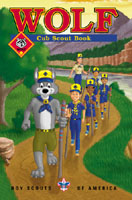|
The Wolf Trail
After your Cub Scout has earned his
Bobcat badge, he
can start along the Wolf Trail. This is a big adventure for a boy, one the
Boy Scouts of America hopes all boys will complete. When you have okayed
the tracks your boy has filled in for all twelve
achievements, he may become a Wolf Cub Scout. How quickly your boy
progresses is up to him and you. He should do his best to complete each
track; that's a part of the promise he made to become a Bobcat and it is
the Cub Scout Motto - Do Your Best. Don't okay a track if
you both know that he can do a better job. Move on to something else, then
go back and try again. The important thing is to keep him interested by
working on the trail with him as often as possible.
[Top]
[Achievements List] [Electives
List]
Wolf Trail Achievements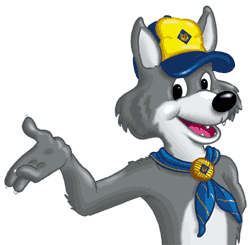
To earn the Wolf badge, a Cub Scout must complete 49
tasks out of a possible 62 tasks in the book. If the Cub Scout has not
previously earned the
Bobcat Badge, it
must be earned first. These activities are done primarily at home and are
signed off by the parent after the Cub Scout has completed each task. The
book is then shown to the Den Leader, who records the progress and signs
the book. Once all the required achievements have been completed, your Cub
Scout will have earned his Wolf badge, which will be presented to him at
the next pack meeting.
[Top]
[Electives List]
1. Feats of Skill.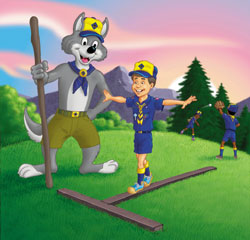
You are growing. You are getting stronger. Try these
feats of skill. Test your speed. Test your balance. Test your strength.
Complete items a through e and any one of f through k.
- a. Play catch with someone ten steps away. Play
until you can throw and catch.
- b. Walk a line back and forth. Do it sideways, too.
Then walk the edge of a board six steps each way.
- c. Do a front roll.
- d. Do a back roll.
- e. Do a falling forward roll.
- f. See how high you can jump.
- g. Do the elephant walk, frog leap, and crab walk.
- h. Swim as far as you can walk in fifteen steps.
- i. Using a basketball or playground ball, do a
baseball pass, chest pass, and bounce pass.
- j. Do a frog stand.
- k. Run or jog for 10 minutes. Or jog in place for 5
minutes.
-
[Top]
[Achievements List] [Electives
List]
2. Your Flag
Your flag stands for our country. Learn some ways to
honor your flag. Complete all of the following requirements.
- a. Give the Pledge of Allegiance to the flag of the
United States of America. Tell what it means.
| I pledge allegiance to the flag of the
United States of America and to the Republic for which it stands,
one nation under God, indivisible, with liberty and justice for
all. |
- b. Lead a flag ceremony in your den.
- c. Tell how to respect and take care of the flag.
Show three ways to display the flag.
- d. Learn about the flag of your state or territory
and how to display it.
- e. With the help of another person, fold the flag.
[Top]
[Achievements List] [Electives
List]
3. Keep Your Body Healthy
Be healthy and strong. Learn what to do to be healthy.
Keep active to be strong. Complete all of the following
requirements.
- a. Show that you know and follow the seven rules of
health.
- Take baths or showers often - once a day if you
can. Use soap.
- Wash your hands before meals and after using the
toilet.
- Brush your teeth before you go to bed and after
breakfast. Brush your teeth or rinse your mouth after eating.
- Drink lots of water (six to eight glasses a day).
- Eat different kinds of food. Do most of your
eating at mealtime. Stay away from too many sweets.
- Run and play ooutdoors.
- Get the sleep you need.
- b. Tell four ways to stop the spread of a cold.
- If you have a cold, stay away from other people.
- Get lots of rest.
- Turn your head away from others when you sneeze
or cough. Cover your mouth and nose.
- Wash your hands often, and always wash them after
you sneeze.
- c. Show what to do for a small cut on your finger.
- Tell a grown-up about the cut.
- Let the cut bleed a little.
- Wash it with soap and water.
- Cover it with a stick-on bandage. For a big cut,
get help fast.
[Top]
[Achievements List] [Electives
List]
4. Know Your Home and Community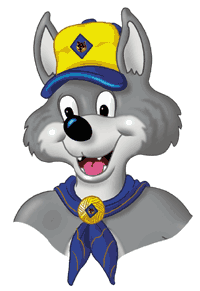
Sometimes your parents have to be somewhere else, and
you must be home without an adult. If you can take care of yourself, no
one will worry. You will be safe and happy. Here are some things to do
when you are home alone, along with some other things to do to be
responsible and helpful in your home.
a. Write down the phone numbers you need to have. Put
them by your phone.
- Police ___________________
- Fire ___________________
- Doctor ___________________
- Mother at work ___________________
- Father at work ___________________
- Family friend ___________________
- b. Tell what to do if someone comes to the door and
wants to come in.
- [NOTE for Akela: Discuss with your boy what to do
if someone wants to come in when your boy is alone.]
-
- c. Tell what to do if someone calls on the phone.
- [NOTE for Akela: Discuss with your boy what to say
if someone calls and your boy is home alone.]
-
- d. When I leave our home I will ...
- Turn off the lights.
- Close and lock the windows.
- Turn off the water.
- Take care of pets.
- Have my key.
- Lock all of the doors.
- [NOTE for Akela: Help your boy to make sure
everything is taken care of before he leaves the house.]
-
- e. Talk with others in your home about helping. Agree
on the home jobs you will do. Make a list of your jobs.
- [NOTE for Akela: You can teach your boy
responsibility by helping him find jobs he can do to help around the
home.]
[Top]
[Achievements List] [Electives
List]
5. Tools for Fixing and Building
You can make something if you know how to use tools. You
can fix things that are broken.
- a. Point out and name eight tools. Do this at home,
or go to a hardware store with a grown-up. Tell what each tool does.
- Plane to smooth wood
- Hacksaw to cut metal
- Handsaw for straight cuts in wood
- File to smooth metal
- Claw hammer to drive nails and pull them out
- C-clamp to hold things in place
- Coping saw for cutting curves in wood
- Plunger to open clogged drains
- Awl to punch holes
- Adjustable Wrench to turn bolts or nuts
- b. Show how to use pliers. Slip-joint pliers for
small jobs and for large jobs.
-
- c. Use a screwdriver to drive a screw.
- Start a hole in the wood with an awl or a nail.
- A screw with soap on it is easier to turn.
- Twist the screw into the hole.
- Pick the right screwdriver to fit the screw.
- Turn the screw until the head is in the wood.
- d. Show how to use a hammer.
- Tap a nail to get it started.
- Lift up the hammer and drop it on the nail. Let
the hammer do the work.
- If you bend the nail, pull it out using the claw
end and a block of wood to rest the hammer on.
- e. Use a pattern or a plan to make a birdhouse, a set
of bookends, or something else useful.
- [NOTE for Akela: Birdhouse kits and other projects
are available at your local Scout shop.]
[Top]
[Achievements List] [Electives
List]
6. Start a Collection
You can collect almost anything. Put your collection
together so that you can show it to your family, den, and pack.
- a. Make a collection of anything you like. Start with
ten things. Put them together in a neat way.
- b. Show and explain your collection to another
person.
[Top]
[Achievements List] [Electives
List]
7. Your Living World
Our world is the only one we have. Take care of it.
There are many ways you can help. This achievement is also part of the
World Conservation Award.
- a. Land, air, and water can get dirty. On a sheet of
paper, list ways this can happen.
- b. It takes a lot of energy to make glass, cans, and
paper products. You can help save energy by collecting these items for
use again. Write the name of the recycling center closest to you. Find
out what items you can save and send to this center.
- c. With a grown-up, pick up litter in your
neighborhood. Wear gloves to protect your hands against germs and cuts
from sharp objects.
- d. With a grown-up, find three stories that tell how
people are protecting our world. Read and discuss them together.
- e. Besides recycling, there are other ways to save
energy. List three ways you can save energy, and do them.
[Top]
[Achievements List] [Electives
List]
8. Cooking and Eating
It's fun to be the cook. The cook fixes the meal and
might not use a stove. You won't need a stove for sandwiches and salads.
- a. Study the Food Guide Pyramid. Name some groups
from each of the food groups shown in the pyramid.
- b. Plan the meals you and your family should have for
one day. List things your family should have from the food groups shown
in Food Guide Pyramid. At each meal, you should have foods from at least
three food groups.
- c. Help fix at least one meal for your family. Help
set the table, cook the food, and wash the dishes.
- d. Fix your own breakfast. Wash and put away the
dishes.
- e. With a grown-up, help to plan, prepare, and cook
an outdoor meal.
[Top]
[Achievements List] [Electives
List]
9. Be Safe at Home and on the Street
You can be careful and safe and still have fun. It's a
lot more fun if you and other people don't get hurt. Let's learn how to be
safe at home, and outside too.
- a. WITH A GROWN-UP, check your home for things that
may help keep you safe.
- b. WITH A GROWN-UP, check for danger from fire.
- c. Practice good rules of street and road safety.
- d. Know the rules of bike safety.
[Top]
[Achievements List] [Electives
List]
10. Family Fun
Here are some things to do that are fun for everyone.
There are games to play, places to go, and things to do with your family.
- a. Make a game like one of these. Play it with your
family. (Eagle Golf, Beanbag Archery.)
- b. Plan a walk. Go to a park or wooded area, visit a
zoo or museum with your family.
- c. Read a book or Boys' Life magazine with your
family. Take turns reading aloud.
- d. Decide with Akela what you will watch on
television or listen to on the radio.
- e. Attend a concert, a play, or other live program
with your family.
[Top]
[Achievements List] [Electives
List]
11. Duty to God
A Cub Scout promises to do his duty to God. What is your
duty to God? How do you do it? Your family can help you learn about God.
This will help.
- a. Talk with your folks about what they believe is
their duty to God.
- b. Give some ideas on how you can show your religious
beliefs.
- c. Find out how you can help your church, synagogue,
or religious fellowship.
[Top]
[Achievements List] [Electives
List]
12. Making Choices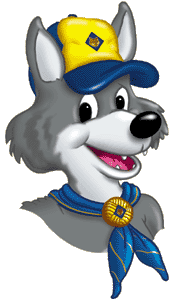
We have to make choices all the time. What to do. Where
to go. Who to be with. Doing these requirements with your parent will help
you learn how to make the best choices.
a. There is an older boy who hangs around Jason's
school. He tries to give drugs to the children. What would you do if you
were Jason?
b. Mel is home alone. The phone rings. When Mel
answers, a stranger asks if Mel's mother is home. She is not. Mel is
alone. What would you do if you were Mel?
c. Justin is new to your school. He has braces on his
legs and walks with a limp. Some of the kids at school tease him. They
want you to tease him, too. What would you do?
d. Juan is on a walk with his little sister. A car
stops and a man asks them to come over to the car. What would you do if
you were Juan?
e. Matthew's grandmother gives him money to buy an
ice-cream cone. On the way to the store, a bigger boy asks for money and
threatens to hit Matthew if he does not give him some money. If you were
Matthew, what would you do?
f. Chris and his little brother are home alone in the
afternoon. A woman knocks on the door and says she wants to read the
meter. She is not wearing a uniform. What would you do if you were
Chris?
g. Sam is home alone. He looks out the window and sees
a man trying to break into a neighbor's back door. What would you do if
you were Sam?
h. Mr. Palmer is blind. He has a guide dog. One day as
he is crossing the street, some kids whistle and call to the dog. They
want you and your friends to call the dog too. What would you do?
i. Some kids who go to Bob's school want him to steal
candy and gum from a store, which they can share later. Bob knows this
is wrong, but he wants to be popular with these kids. What would you do
if you were Bob?
[Top]
[Achievements List] [Electives
List]
End of Requirements section.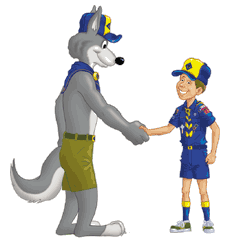
Home
| Cub Scout Ranks |
Top | Achievements List |
Electives List
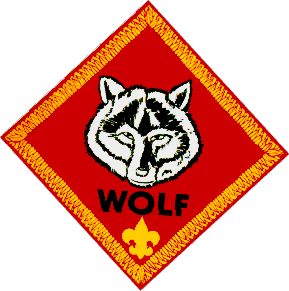 Wolf
Trail Electives Wolf
Trail Electives
Your Cub Scout can also search the Arrow Point trail. On
the Wolf trail, the main sections were called achievements, things that we
would like all boys to do. On the Arrow Point trail, the main sections are
called electives, choices that a boy can make on his own and with your
guidance.
To earn a Gold Arrow Point to wear beneath his Wolf
badge, a boy must complete any ten elective projects of the more than one
hundred choices shown in the book. For every ten additional electives he
completes, the Wolf Cub Scout qualifies for a Silver Arrow Point to wear
beneath the Gold. He can earn as many Silver Arrow Points as he wants
until he completes the second grade (or turns 9). Arrow Points are
presented at the pack meeting after he receives his Wolf badge.
Your boy should begin earning acheivements toward his
Wolf badge as soon as he completes the Bobcat requirements. Completing
electives for Arrow Points generally should wait until after he has earned
his Wolf badge, and he cannot receive Arrow Points until he has been
awarded his Wolf badge. He might, however, find some electives that he
could be completing before he earns the Wolf badge. Some of the activities
in "Sports," Wolf Elective 20, might be examples. As long as he completes
these electives after he has earned his Bobcat, you may credit him for
them, but be sure to keep him focused on the twelve achievements until he
completes them.
These activities are done primarily at home and are
signed off by the parent after the Cub Scout has completed each task. The
book is then shown to the Den Leader, who records the progress and signs
the book.
[Top]
[Achievements List]
Elective 1: It's a Secret
Learn to send secret messages. Only those who know the
secret code can read them. Learn to "talk" with your hands.
- a. Use a secret code.
- b. Write to a friend using invisible "ink."
- c. "Write" your name with the alphabet that deaf
people use.
- d. Use twelve Native American signs to tell a story.
[Top]
[Achievements List] [Elective List]
Elective 2: Be an Actor
It's fun to be an actor. You can make-believe you are
anyone you want to be.
- a. Help to plan and put on a skit with costumes.
b. Make some scenery for a skit.
c. Make sound effects for a skit.
d. Be the announcer for a skit.
e. Make a paper-sack mask for a skit.
[Top]
[Achievements List] [Elective List]
Elective 3: Make It Yourself
Watch carpenters and craftsmen at work. Learn how to
handle tools; then pick a project and do it.
- a. Make something useful for your home or school.
Start with a Recipe Card Holder
b. Make a ruler and measure to see how far you can stretch your hand.
c. Make and use a bench fork.
d. Make a door stop.
e. Or make something else.
[Top]
[Achievements List] [Elective List]
Elective 4: Play a Game
Play these games with children younger than you are,
with other Cub Scouts, or with grown-ups.
- a. Play Pie-tin Washer Toss
b. Play Marble Sharpshooter
c. Play Ring Toss
d. Play Beanbag Toss.
e. Play a game of marbles
[Top]
[Achievements List] [Elective List]
Elective 5: Spare-Time Fun
Ride the wind and waves with kites and boats you can
make yourself.
- a. Explain safety rules for kite flying.
b. Make and fly a kite.
c. OR make a two-stick kite.
d. OR make a three stick kite.
e. Make and use a reel for kite string.
f. Make a model boat with a rubber-band propeller.
g-h-i Make or put together some kind of model boat, airplane, train, or
car.
[Top]
[Achievements List] [Elective List]
Elective 6: Books, Books, Books
Books are magical. They are the spaceships of our minds.
With them you can go anywhere.
- a. Visit a bookstore or go to a public library with a
grown-up. Find out how to get your own library card. Name four kinds of
books that interest you (for example, history, science fiction, how-to
books).
b. Choose a book on a subject you like and read it. With an adult,
discuss what you read and what you think about it.
c. Books are important. Show that you know how to take care of them.
Open a new book the right way. Make a paper or plastic cover for it or
another book.
[Top]
[Achievements List] [Elective List]
Elective 7: Foot Power
Foot Power is a balancing act. Can you walk when your
feet are off the ground? It's not as hard as it looks!
- a. Learn to walk on a pair of stilts.
b. Make a pair of "puddle jumpers" and walk with them.
c. Make a pair of "foot racers" and use them with a friend.
[Top]
[Achievements List] [Elective List]
Elective 8: Machine Power
Learn about machines. A stick can be used as a lever. A
log can be used as a wheel or a roller. Talk to workers who use levers and
wheels every day.
- a. Name ten kinds of trucks, construction machinery,
or farm machinery.
b. Use a wheel and axle.
c. Use a pulley.
d. Make and use a windlass.
[Top]
[Achievements List] [Elective List]
Elective 9: Let's Have a Party
Parties are more fun when you've made a gift yourself
and helped plan and put on the party.
- a. Help with a home or den party.
b-c Make a gift or toy like one of these and give it to someone.
[Top]
[Achievements List] [Elective List]
Elective 10: Native American Lore
The first Americans were called Indians because Columbus
thought he was near India when he got here. The more you know about these
Native Americans, the more you will know about America.
- a. Read a book or tell a story about Native
Americans, past or present.
b. Make a musical instrument used by Native Americans.
c. Make traditional clothing.
d. Make a traditional tool.
e. Make a model of a traditional house.
f. Learn twelve word pictures and write a story with them.
[Top]
[Achievements List] [Elective List]
Elective 11: Sing-Along
Learn to sing lots of songs. There are glad songs and
sad songs, and some are proud, like "The Star-Spangled Banner."
- a. Learn and sing the first and last verses of
"America."
- b. Learn and sing the first verse of our national
anthem.
c. Learn the words and sing three Cub Scout Songs.
d. Learn the words and sing the first verse of three other songs, hymns,
or prayers. On a piece of paper, write the verse of one of the songs you
learned.
e. Learn and sing a song that would be sung as a grace before meals.
Write the words on a piece of paper.
[Top]
[Achievements List] [Elective List]
Elective 12: Be an Artist
You can't tell if you can draw a picture until you try.
Someday, you could become an artist or a draftsman.
- a. Make a freehand sketch
b. Tell a story in three steps by drawing three cartoons.
c. Mix yellow and blue paints to make green, yellow and red to make
orange, and red and blue to make violet.
d. Help draw, paint, or crayon some scenery for a skit, play, or puppet
show.
e. Make a stencil pattern
f. Make a poster for a Cut Scout project or a pack meeting.
[Top]
[Achievements List] [Elective List]
Elective 13: Birds
Some birds are summer visitors. Others pass through in
the spring and fall, while still others live in the same area all year.
They all need homes and food. This elective is also part of the
World Conservation Award.
- a. Make a list of all the birds you saw in a week and
tell where you saw them (field, forest, marsh, yard, or park).
b. Put out nesting material (short pieces of yarn and string) for birds
and tell which birds might use it.
c. Read a book about birds.
d. Point out ten different kinds of birds (five may be from pictures).
e. Feed wild birds and tell which birds you fed.
f. Put out a birdhouse and tell which birds use it.
[Top]
[Achievements List] [Elective List]
Elective 14: Pets
Your pet might be a dog, cat, rabbit, parakeet, or a
tropical fish. All pets need care--even crickets.
- a. Take care of a pet.
b. Know what to do when you meet a strange dog.
c. Read a book about a pet and tell about it at a den meeting.
d. Tell what is meant by rabid. Name some animals that can have rabies.
Tell what you should do if you see a dog or wild animal that is behaving
strangely. Tell what you should do if you find a dead animal.
[Top]
[Achievements List] [Elective List]
Elective 15: Grow Something
Growing a garden is almost like magic. You put tiny
seeds into the ground and presto, little green plants spring up.
This elective is also part of the
World Conservation Award.
- a. Plant and raise a box garden.
b. Plant and raise a flower bed.
c. Grow a plant indoors.
d. Plant and raise vegetables.
[Top]
[Achievements List] [Elective List]
Elective 16: Family Alert
Would you know what to do if your home was hit by a
tornado, flood, or hurricane? Here are three things you can do.
- a. Talk with your family about what you will do in an
emergency.
b. In case of a bad storm or flood, know where you can get safe food and
water in your home. Tell how to purify water. Show one way . Know where
and how to shut off water, electricity, gas, or oil.
c. Make a list of your first-aid supplies, or make a first-aid kit. Know
where the first-aid things are kept.
[Top]
[Achievements List] [Elective List]
Elective 17: Tie It Right
Do your shoes come untied all by themselves? maybe the
knots you tie are to blame.
- a. Learn to tie an overhand knot and a square knot.
b. Tie your shoelaces with a square bow knot.
c. Wrap and tie a package so that it is neat and tight.
d. Tie a stack of newspapers the right way.
e. Tie two cords together with an overhand knot.
f. Learn to tie a necktie.
g. Wrap the end of a rope with tape to keep it from unwinding.
[Top]
[Achievements List] [Elective List]
Elective 18: Outdoor Adventure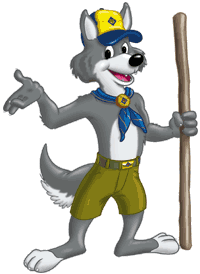
A lot of Cub Scouting belongs outdoors with picnics,
treasure hunts, and adventure trails.
- a. Help plan and hold a picnic with your family or
den.
b. With a parent, help plan and run a family or den outing.
c. Help plan and lay out a treasure hunt something like this.
d. Help plan and lay out an obstacle race. Use this idea or make up your
own.
e. Help plan and lay out an adventure trail.
f. Take part in two summertime pack events with your den.
g. Point out poisonous plants. Tell what to do if you accidentally touch
one of them.
[Top]
[Achievements List] [Elective List]
Elective 19: Fishing
In fishing, boys and grown-ups are equal. The fish does
not know how old the person is at the other end of the line. This
elective is also part of the
World Conservation Award.
- a. Point out five fish.
b. Rig a pole with the right kind of line and hook. Attach a bobber and
sinker, if you need them. Then go fishing.
c. Fish with members of your family or a grown-up. Bait your hook and
catch a fish.
d. Know the rules of safe fishing.
e. Tell about some of the fishing laws where you live.
f. Show how to use a rod and reel.
[Top]
[Achievements List] [Elective List]
Elective 20: Sports
Before beginning this elective, discuss sportsmanship*
with Akela or another adult.
- a. Play a game of tennis, table tennis, or badminton.
b. Know boating safety rules.
c. Know archery safety rules. Know how to shoot properly. Put four of
six arrows into a 1.2-meter target that is fifteen steps away from you.
d. Understand the safety and courtesy code for skiing. Show walking and
the kick turn. Do climbing with a side step or herringbone. Show the
snowplow or stem turn, and how to get up from a fall.
e. Know the safety rules for ice skating. Skate, without falling, as far
as you can walk in fifty steps. Come to a stop. Turn from forward to
backward.
f. In roller skating, know the safety rules. From a standing start,
skate forward as far as you can walk in fifty steps. Come to a stop
within ten walking steps. Skate around a corner one way without
coasting. Then do the same coming back. Turn from forward to backward.
g. Go bowling.
h. Show how to make a sprint start in track. Run 45 meters in 11 seconds
or less.
i. Play a game of touch or flag football.
j. Show how to dribble and kick a soccer ball. Take part in a game.
k. Play a game of baseball or softball.
l. Show how to shoot, pass and dribble a basketball. Take part in a
game.
*Sportsmanship is discussed in the Cub Scout
Academics and Sports Program Guide and in the
Academics and
Sports page of this web site.
[Top]
[Achievements List] [Elective List]
Elective 21: Computers
Computers can make jobs or learning new things easier
and computer games can be fun.
- a. Visit a place where computers are used. Find out
what they do.
b. Explain what a computer program does. Use a program to write a report
for school, to write a letter, or for something else.
c. Tell what a computer mouse is. Describe how a CD-ROM is use.
[Top]
[Achievements List] [Elective List]
Elective 22: Say it Right
Being able to say what you mean is very important.
- a. Say "hello" in a language other than English.
b. Count to ten in a language other than English.
c. Tell a short story to your den, your den leader, or a grown up.
d. Tell how to get to a nearby fire station or police station from your
home, your den meeting, and school. Use directions and street names.
e. Invite a boy to join Cub Scouting or help a new Cut Scout through the
Bobcat trail.
[Top]
[Achievements List] [Elective List]
|
